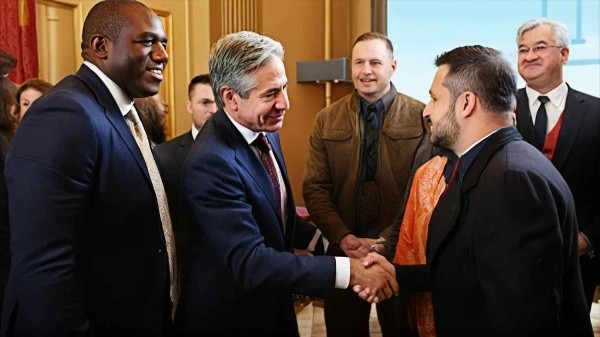Iran’s Plan to Strike Back Against the U.S.
Iran’s Military Preparations Following U.S. Attacks
Loading...

If Washington expands weapons authorisation, NATO will be directly involved in the war, says the Russian leader.
Potential Shift in US Policy
In recent developments, there is a possibility that the United States might adjust its stance on Ukraine's use of American-made weapons, potentially enabling strikes deep inside Russian territory. President Joe Biden indicated that discussions were ongoing regarding lifting geographic restrictions on weapon usage by Ukraine. This potential policy shift comes after consistent appeals from Ukraine for expanded military capabilities to target beyond its borders.
International Diplomatic Dynamics
On a diplomatic front, US Secretary of State Antony Blinken, in a joint statement with British Foreign Secretary David Lammy during their visit to Kyiv, expressed attentiveness to Ukraine's requests, hinting at possible policy changes. Discussions between President Biden and British Prime Minister Keir Starmer were scheduled to explore this issue further. Meanwhile, Michael McCaul, Chairman of the House Foreign Affairs Committee, speculated that the US might soon inform Ukraine of its ability to conduct cross-border operations, marking a significant shift from previous US policy.
Putin’s Reaction and NATO Concerns
The possibility of NATO countries authorizing Ukraine to strike within Russia has elicited a stern response from Russian President Vladimir Putin. He warned that such actions would equate to direct NATO involvement in the conflict, fundamentally altering the nature of the war. Putin’s statements underscore the heightened tensions and potential for escalation, as Western countries continue to support Ukraine with military intelligence and weaponry.
Nuclear Fears and Strategic Calculations
Fears of nuclear escalation have been a persistent concern throughout the conflict. However, CIA Director William Burns downplayed the likelihood of Russia deploying nuclear weapons, labeling Putin's threats as typical sabre-rattling. Burns noted that the strategic utility of nuclear weapons had been evaluated and dismissed by Russia earlier in the conflict. General Ben Hodges further elaborated that there is no strategic gain for Russia to use nuclear weapons on the current front lines, as it would isolate Russia diplomatically and economically.
Russian and Allied Military Developments
The conflict has seen Russia seeking military support from allies like North Korea, Iran, and China. Reports indicate that Iran has supplied Russia with short-range ballistic missiles, while China has been providing direct military technology, marking a significant shift from previous sales of dual-use technologies. These alliances have fortified Russia’s military capabilities even as Western nations continue to support Ukraine.
Conclusion: A Complex Geopolitical Landscape
As the conflict in Ukraine continues, the potential change in US policy regarding weapon use signifies a critical juncture. The international community remains on high alert, with diplomatic and military strategies constantly evolving. The involvement of global powers and their shifting alliances further complicate the geopolitical landscape, making the path to resolution fraught with challenges. The world watches closely as these developments unfold, aware of the profound implications they hold for international peace and security.
BMM - MBA
Iran’s Military Preparations Following U.S. Attacks
Troops remain in five strategic locations, raising fears of renewed tensions and long-term occupation.
Opposition forces have taken control of the capital after a significant offensive. Here is how it unravelled.
